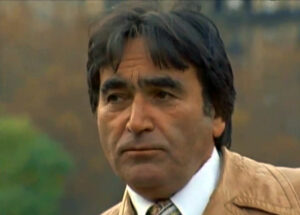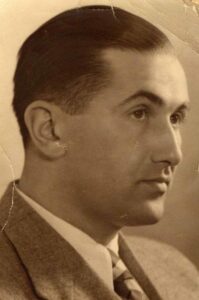A reflection on ‘Escaping the Holocaust: The Alfred Landecker Memorial Lecture’
Henry Holmes, Fourth Form pupil, writes:
‘Belief is important.
When Rudolf Vrba presented the Vrba-Wetzler Report on Auschwitz’s existence, the American Supreme Judge said: ‘I do not think you’re lying. I just don’t want to believe you.’
‘That was how horrible the idea of a factory of death was’, said Johnathan Freedland, Guardian Journalist and World War Two historian, last Tuesday evening at Oxford University’s Blavatnik School of Government.
Jonathan recounted a deeply moving and inspirational talk about the escape story of 19-year-old Walter Rosenberg, who later had to change his name to Rudolf Vrba. He was born on the 11th September 1924 in Czechoslovakia into an Orthodox Jewish family. After his father passed, his mother sent him to an elite Gymnasium (a highly selective type of boarding school in Germany), but when he turned 16, he was kicked out because he was a Jew.

Rudolf Vrba
Like so many others, Vrba ended up in a concentration camp called Majdanek in German-occupied Poland. Desiring to work outside, he volunteered to be transferred to Auschwitz. When he arrived, he got put to work with sorting clothes, pots, and pans into lots – repurposing the possessions which had been stripped from Jewish families as they entered the camp. It took Vrba six months of working to finally realise the gravity of his work.
He was later moved to help the new arrivals, where he made an escape plan to tell people beyond the fences the truth about the camps. It was devastating to learn that many were led to believe that they were going to be taken by the trains to a new home far from Germany when the truth was vastly different. Jonathan talked about how the Jews were lied to every moment of their journey, including as they were led into the fake showers.
Incredibly, Vrba escaped. His reports helped some to accept the reality of what was happening, leading to some sympathetic officials to even try and stop the trains. Vrba saved up to two hundred thousand people who might otherwise have believed the German propaganda designed to manipulate their Jewish victims into compliance. Whilst his efforts were incredible, they were a drop in the ocean. Six million people were murdered in the Holocaust, and many people today have family who were persecuted.
My own great-grandfather was an Austrian Jew who fled Europe in 1938 after the Anschluss (the unification of Germany and Austria). Whilst working as a trainee doctor in a German military hospital, the evident rise in antisemitism made him realise he needed to escape. Without telling his parents, he booked his tickets to take him the furthest he could get from Germany’s reach. The only country that accepted his visa was New Zealand. After my great-grandfather changed his name from Ludwig to Lewis to blend in, he married a Kiwi and had five children, including my grandmother. He recounted feeling very guilty for leaving his parents in Europe, thinking they had surely been persecuted. But when he returned after the war, he was relieved to find his parents happy and healthy. They had gone to Brussels and were hiding in an attic until they were caught one month before the war ended. Just as they were boarding the train to be sent to certain death, the Allied Forces captured the train station and liberated them and hundreds of other Jews. It was a close escape.

Henry Holmes’ great-grandfather
As I began this article, I realised one thing: belief is important. The horror of the truth was so severe that many Germans did not want to believe, or wilfully tried to ignore, what was happening. Perhaps this is the danger today when we look at the news. What happened to Vrba must be a lesson to us all – belief is a powerful tool that is necessary to be able to make a difference.’